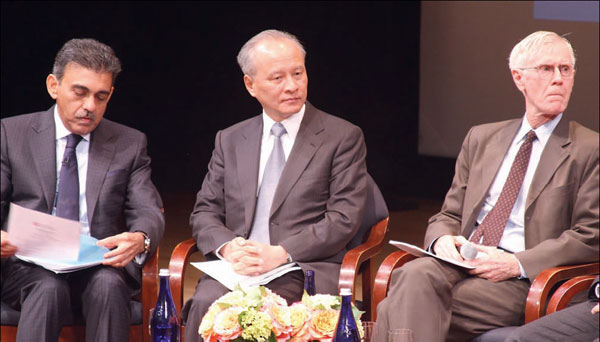|
 Cui Tiankai (center), ambassador of the People's Republic of China to the US, attends a panel about Asia's path toward peace and prosperity at the launch of the Asian Society's new think tank, the Asia Society Policy Institute. From left: V. Shankar, CEO for Europe, Middle East, Africa and Americas at Standard Chartered; and Orville Schelle, director of Asia Society's Center on US-China Relations. Amy He / China Daily |
The new group has a global network of experts - linked by state-of-the-art technology - working on research and policy related to matters of importance to Asia and how Asia connects with the rest of the world.
President and CEO of the Asia Society Josette Sheeran said that it doesn't feel like an Asian-centric think tank exists today, and that if asked about the leading experts in specific areas dealing with Asia, it would be hard to do so; thus the impetus to create the Asia Society Policy Institute (ASPI) came to be.
"This is really the first time we'll put all our policy work under one roof. It's a truly innovative global think tank," Sheeran said. "Don't imagine an ivory tower. This will be a hub of Asia-wide experts and thought leaders that are focused on creating policy solutions to advance Asia's prosperity, security and sustainability."
Sheeran said that she doesn't feel that global institutions have "fully adjusted" to Asia's rise, and therefore ASPI wants to play a role in starting the dialogue to create solutions to issues.
ASPI will have experts in countries across Asia and globally as well, and will be looking to hire less than a dozen key fellows, according to Sheeran, with the Asia Society launching a capital campaign to endow the chairs.
"I like the term 'solutions for the Asian century'," said Cui Tiankai, China's ambassador to the US, at the launch. "I had an email exchange with Ambassador Mirpuri from Singapore and we talked about the concept of whether we should say 'Chinese century' or 'Asia century'. Most of us prefer the 'Asian century'," he joked.
Cui mentioned that in light of the 35th anniversary of the establishment of China-US diplomatic relations, it's more important than ever to "reject more firmly the Cold War mentality", to rise "beyond the constraints and confines of outdated alliances and engage in forming a new and broader partnership".
The relationship between China and the US is of particular importance if people want to see the "right solution to the Asian century", Cui said.
|
Henry Kissinger (left), former US Secretary of State, and Zhu Min, deputy managing director of the International Monetary Fund, in conversation at the launch of Asia Society Policy Institute, a new think tank. Amy He / China Daily |
It is encouraging that the leaders of the two countries are determined to "build a new model" of the nations' relationship, but the challenge now remains implementation of the policies, he said.
"We should be proud of what we have achieved, and we certainly should be confident of what we shall be achieving in the future," he said.
The launch event also featured former US Secretary of State Henry Kissinger in conversation with the International Monetary Fund's deputy managing director Zhu Min.
"Asia is a key element of American strategy," Kissinger said. Zhu asked Kissinger about the role he thinks the US should play, especially in light of China-Japan tensions, and Kissinger said that the US government should avoid any inflammatory action.
He said that it's hard to give a formula in terms of how to deal with the two countries because "each of the two societies has no experience in this kind of relationship". The US and China both have never dealt with another country approximately equal in size and power, he said.
He said that the US - or any of the three countries - should not "exercise military demonstration", adding that China as a country has "grown more by osmosis than conquest".
Speaking of the new ASPI think tank, Ronnie C. Chan, co-chair of Asia Society's board of trustees and chairman of Hang Lung Group Limited, said: "We identify and define problems and find innovative ways, drawing upon our vast network, to address them. Our approach should yield pleasing, if not surprising, results."
